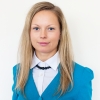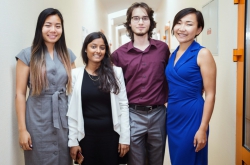SumIT
This year’s SumIT acceleration program featured startups from South Korea. They are: Rozebelle, a smart security device for women that can send emergency messages to police and friends; juice delivery company “5AM”; “Idea Muse” potted plant control system. More about the projects here.
These three teams have been selected from 14 South Korean applicants by the Chungbuk Center for Creative Economy & Innovation, a government organization for the South Korean Ministry of Science and ICT. Team members have undergone intensive training in their home country. At ITMO University, the young entrepreneurs learned about the specifics of business management in Russia and the needs and demands of Russian customers. Each team was mentored by a Russian-speaking student who would help them get acquainted with the nuances of life in Russia, the local traditions and culture, as well as the rules of conduct with potential partners. In the course of their training, the teams have already received several partnership offers from local companies.

Vladimir Mun
“Markets don’t differ only between countries; even two cities can be quite different. This experience was very important for the South Korean teams, as it has allowed them to look from a different perspective on some less-than-obvious things. For instance, we learned that in Russia freshly-squeezed juices or smoothies are often associated with entrepreneurs and businessmen, that they are the sort of people to have juice delivered to them in the morning. Back in South Korea, businessmen tend to drink coffee in the morning,” – comments Vladimir Mun, partner at RHC Consult, a South Korean consulting company that works with startups in Russia and South Korea.
He emphasizes that the Korean side is interested in continuing their partnership with ITMO University and plans to bring other startups to SumIT Summer School next year. There are also plans to organize trips for Russian startup teams to South Korea to provide them with a similar experience.
The winner of the SumIT program is the startup Rozebelle.

MIT Global Startup Labs
Some of the classes and workshops at SumIT were conducted by experts from the Massachusetts Technological University as part of the business acceleration program MIT Global Startup Labs, held for the first time in Russia in collaboration with ITMO University’s business incubator and Faculty of Technological Management and Innovations. This program was set up by MIT student Paul Njoroge after he had went on a trip to Africa and was dismayed at the fact that many African students are not exposed to a curriculum that focused on technologies appropriate to their environment. The founders had a vision that saw MIT students/instructors traveling to Africa to teach technology and promote development in African schools, so as to expose students to appropriate technologies that would help them to solve local problems and take advantage of local opportunities.
In 2000, the pilot project, called AITI (Africa Internet Technology Initiative), was launched in Kenya. In 2011 the name was changed to reflect the project’s global scope.

Ekaterina Zabrovskaya
The methodology of the program is based on the principles laid out by head of MIT’s Sloan School of Management, Bill Aulet. Developed specifically for tech startups, the methodology is a precise sequence of steps for setting up one’s own business. As MIT Russia’s Program Manager, Ekaterina Zabrovskaya, explains, the program’s mentors know these steps by heart.
“It’s important to us that students from universities in different countries and first-time entrepreneurs also familiarize themselves with our methodology. At MIT, everything is based on enthusiasm. If students or professors feel the need to develop something, it gets done. For example, we have two professors who believe that it’s important to develop a partnership with Russia. It’s too early to talk about the results of MIT Global Startup Labs in Russia; after all, this is the first time that the program has been launched here and we still need to process the information we have received. Yet I can see that the participants here do have great projects and they’re full of enthusiasm and motivation to stay in business. And that’s what matters most to us,” – comments Ms. Zabrovskaya.
Michael Burns, Assistant to the Consul General of the United States in Saint Petersburg, spoke at DemoDay and noted that the development of business partnerships between Russia and the USA is a crucial part of maintaining the relationship between the two countries. This kind of cooperation can help overcome this difficult time in the relations between them, he says.

Russia’s first MIT Global Startup Labs program was attended by 29 programmers, economists and managers from Moscow, St. Petersburg and Irkutsk. They were split into teams and tasked with building their projects from the ground up over eight weeks of intensive training. In two months, they had not only to develop a business model for their startup, but to present a prototype and test it among their target audience.
“We intentionally brought people from different regions here so that the teams would be made of different people with various skills who together can complete the technological and the entrepreneurial sides of their projects,” – emphasizes head of ITMO’s business incubator Elena Gavrilova.
The jury was made up of representatives from venture funds, including Leorsa Innovations and Venture Club, members of the St. Petersburg Organization of Angel Investors and other organizations that support and develop innovational businesses. Thus the participants had the opportunity to receive valuable feedback or even partnership offers from potential investors. Projects were judged by their marketability, target audience, advantages over competitors, relevance of their core goal and other qualities.

First Step development team
The winner was the team that developed an application called First Step. It allows users to make contacts at bars and restaurants. When a user enters a venue, they can use First Step to see if any other users are also present there. If they take a liking to someone, they can offer their “match” a drink. The project will be monetized through agreements with bars and restaurants – developers will receive part of the profits for the drinks sold through the app.
The runner-ups were the team of the project SpeakAbility. This team has developed a service for users who want to become fluent in English. What makes it novel is that the application lets them take part in real-life encounters together with a personal mentor. It would be most useful to those who, while familiar with the fine points of grammar, cannot maintain actual conversation in a foreign language.

SpeakAbility development team
As their prize, both teams have received an invitation to take part in the next session at Future Technologies accelerator program without “entrance exams”.
Overall, seven teams have taken part in the MIT Global Startup Labs program. More about each project here. MIT representatives have expressed their interest in resuming their program at ITMO University next year.






